




 |
   |
 |
|
Lanny Cordola Finn Coren Hugh Cornwell Coronet Blue |
Corpses as Bedmates Emanuele Correani Cosmic Jokers Cosmos Factory |
Alfio Costa Nick Costa Elvis Costello |
Katie Costello Kristen Cothron Cotó en Pèl |
Julian Cope (UK) see: |
 |
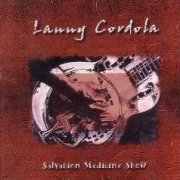 |
Salvation Medicine Show (1998, 53.38) ***/½ |
|
| Last Call If I Ever Needed Someone Confessions Salvation Medicine Show Livin' in Spin Mrs. O'Neal This Harsh Land God's Trombone |
Blue Buckets of Misery Pathetic Infirmary Lowville Your Quick Demise Eulogy for a Friend |
|
Current availability:
Mellotron used:
Lanny Cordola seems to be best known as a guitar shredder who's worked with hair-gods Giuffria and House of Lords (Gregg Giuffria of both outfits is ex-Angel), so his eclectic 1998 solo effort, Salvation Medicine Show, comes as quite a surprise. Influences include country, folk, blues and the more desolate end of the singer-songwriter spectrum, with considerable use of muted brass across the album, better tracks including Livin' In Spin, This Harsh Land, Your Quick Demise and the nearest the album gets to 'rock' in any form, closer Eulogy For A Friend.
Gary Thomas Griffin plays Mellotron, but only just, with a brief string part on Eulogy For A Friend, although a couple of other string parts sound more generic. So; interestingly unexpected, with several decent tracks, although the overall vibe is a bit too downbeat to be sustained over the better part of an hour. Next to no Mellotron, but it's hardly the album's defining feature, anyway.
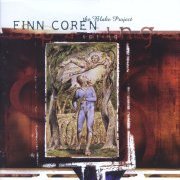 |
Spring (1997, 70.07) **½/T½ |
|
| The Ecchoing Green The Garden of Love Spring The Fly The Tyger London The Chimney Sweeper The Voice of the Ancient Bard Holy Thursday one Holy Thursday two |
Silent Melancholy The Divine Image The Little Boy Lost The Little Boy Found Infant Sorrow Cradle Song A Dream To Tirzah Jerusalem The Sick Rose |
|
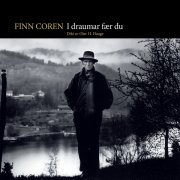 |
I Draumar Fær Du (2008, 130.13) ***/TT |
|||
| Det er den Draumen Sju Vindar Kom Ikkje Med Heile Sanningi Song, Trø Lett på Hjarta Mitt Eit Tre i Brand Kirsebærtreet Vårkjenning I William Blake Du Toler Ikkje |
Steinguden Eg Stoggar Under den Gamle Eiki ein Regnvêrsdag Det er Kaldt i Store Hus Eg Stend Her No Mange Års Røynsle Med Pil og Boge Seint Gjeng Sanningi Upp Tåre, du Tarv Ikkje Falla Det er den Draumen - Epilog |
Dette Lyt du Bera Din Veg Enno er det Tid Under Bergfallet Kor Lenge Har du Sove? T'ao Ch'ien Spelemannen frå Dooney Kirsebærtreet Vårkjenning II |
Var det Ikkje du? Når Eg Vaknar Ofelia Paul Celan Dødsfuge Under Stjernone Vinternatt Eg Dreg Ifrå Glaset Svevn |
|
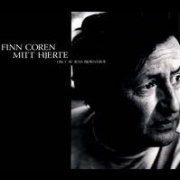 |
Mitt Hjerte (2011, 76.41) ***/TT½ |
||
| Mitt Hjerte Mea Maxima Culpa Et Lite Kjærlighetsdikt Gjensyn Med en Kjærlighet Besøk Ynglingen Spurven Du Våkner |
Likskjorten Rosa-Sangen Ischariot Vinter De Fruktbare Natten Søstrene Modning |
Elegi for en Hengt Soper Vise om Byen Hiroshima Kjærlighetssang Sten Mot Ruten: Dikt i Natten |
|
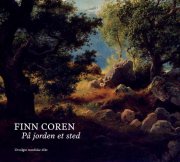 |
På Jorden et Sted: Utvalge Nordiske Dikt (2015, 54.32) ****/TT |
|
| Salme Innbying Ei Dagbok for Mitt Hjarte - X Ville Vinger Sång Alle Veier Bort Fra Dig Lengst Inne Det är Vackrast När det Skymmer |
Til Hjertene Ildfluene Trolldom Havet Koma ein Kveld Salme På Jorden et Sted Du Min Själ Bliv Aldrig Stilla |
|
Current availability:
Mellotrons/Chamberlin used:
Despite having a name as Irish as a leprechaun sitting on a shamrock in a peat bog near Tipperary, Finn Coren (Voldnes) is actually Norwegian, as his accent duly confirms. The Blake Project: Spring is beautifully packaged and, after finding it in the 'folk' section of a central London record shop, I was looking forward to giving it a spin. Hmmm. Well, it ain't 'folk' and it certainly isn't even remotely 'progressive' in any way. Try 'third-rate 'modern rock', with far too many percussion loops and naff guitar sounds for its own good', or 'U2 on a particularly bad day'. The album's concept is excellent; take twenty poems by noted British mystic William Blake and set them to music, ignoring any previous settings they may have had. Unfortunately, the music rarely matches the lyrics in any meaningful way; I suspect Blake would've been horrified by some of the maulings to which his work has been subjected here.
Coren's frequently half-spoken, half-whispered vocals irritate after a while, too, although they're nowhere near as bad as his regular 'singing' voice. There are a few tracks that made me stop and listen, including Spring, London, The Voice Of The Ancient Bard and The Sick Rose (probably the best thing here), i.e. the quiet ones, although most of it had me reaching for the 'next' button, I'm afraid. Tyger (as in 'Tyger, burning bright') is awful and his take on Women's Institute fave Jerusalem is very poor. If only he'd stop trying to be quite so 'contemporary', stuck to writing, playing and producing and got in a decent singer, he might make a halfway decent record. I'm sorry to be so down on this, as it looked so promising, but I'm having trouble finding anything positive to say about it at all. Oh, you noticed? However... Coren's Mellotron work isn't bad, with some decent enough flutes on Spring and various flute and string parts on the other highlighted tracks, but despite various rave reviews I've found on the 'Net, I can't honestly recommend this to anyone at all. Very disappointing.
2008's hugely ambitious double-disc, I Draumar Fær Du, is a big improvement on Spring, I'm glad to say, although I have to be honest and say it didn't floor me with its genius. Ironically, it's the folk-influenced album I'd been hoping for first time round, although Coren runs through a whole gamut of styles over its two hours-plus length, including relatively contemporary indie, near-prog spoken-word material and even hints of pre-war jazz. I suspect you need to understand Norwegian to really get the most out of this album, as I haven't got the faintest idea what he's writing about, although a track entitled William Blake shows that his interest in/obsession with the great man hasn't diminished in the intervening decade.
Lars Fredrik Frøislie (Wobbler, White Willow, a host of others) has become Norway's premier vintage keys man over the last few years, so it's no great surprise he plays Mellotron here. Now, I'm far from convinced I've spotted every last background chord, but on disc one I can hear strings on Sju Vindar, Eg Stend Her No and possible strings (alongside real ones) plus cellos and maybe even brass on Tåre, Du Tarv Ikkje Falla. Disc two has flutes on Dette Lyt Du Bera and one of the MkII 'moving strings' phrases on Enno Er Det Tid that would've fooled me into thinking it was real were it not for the drastic pitchbends, plus flutes on Var Det Ikkje Du? and Vinternatt. Those moving strings could well be used elsewhere, but given how close they sound to the real thing, it's very difficult to tell.
2011's Mitt Hjerte is every bit as sparse as (and, thankfully, rather shorter than) its predecessor, highlights including the opening title track, Besøk, the breathy Spurven and Ischariot, amongst others. By and large, the quieter tracks work better to my ears, but you may disagree. Frøislie plays Mellotron and Chamberlin this time round, with a mix of strings from both instruments on the title track, Chamby cellos, strings and flutes on Besøk, Mellotron flutes and strings on Ynglingen, Chamby strings on Rosa-Sangen and overt flutes on Vinter, Mellotron strings on Søstrene and distant choirs on Modning and, finally, Chamby flutes on Kjærlighetssang.
The subtitle of 2015's På Jorden et Sted: Utvalge Nordiske Dikt, 'Selecting Norwegian Poetry', tells us that Coren's set a raft of poets' work to music, the end result being easily his best album yet. Highlights include Innbying, Sång and Alle Veier Bort Fra Dig, but, unlike some of his previous releases, nothing here disappoints. Mellotron and Chamberlin from Frøislie again, with hesitant flutes (Mellotron?) and vibes (Chamby?) on Alle Veier Bort Fra Dig, Lengst Inne and Til Hjertene and more upfront flutes on the instrumental take of opener Salme, although there's nothing obvious on either Trolldom or Havet.
See: Samples etc.
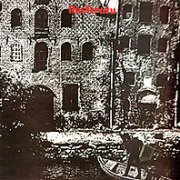 |
Nosferatu [as Hugh Cornwell & Robert Williams] (1979, 35.22) ***/T |
|
| Nosferatu Losers in a Lost Land White Room Irate Caterpillar Rhythmic Itch Wired Big Bug Mothra |
Wrong Way Round Puppets |
|
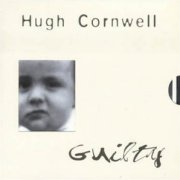 |
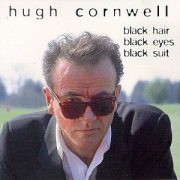 |
Guilty [a.k.a. Black Hair Black Eyes Black Suit] (1997, 50.57/55.18) ***½/T |
|
| One Burning Desire Snapper Nerves of Steel Black Hair Black Eyes Black Suit Hot Head Endless Day Endless Night Five Miles High Sravandrabellagola |
Long Dead Train Torture Garden House of Sorrow [US ed. loses Five Miles High and adds: Jesus Will Weep Not Hungry Enough] |
||
Current availability:
Chamberlin/Mellotron used:
Hugh Cornwell was, of course, The Stranglers' vocalist/guitarist from the mid-'70s until around 1990, which means he co-wrote and played on all their best material, not to mention a lot of their later cack. Robert Williams had been Captain Beefheart's drummer for the previous two years, so was no stranger to odd music, which all in all was a rather good thing, all things considered. Nosferatu consists of the various bits'n'pieces that Hugh didn't consider suitable for the Stranglers and, frankly, you can see why. The title track is plain bizarre, as is Irate Caterpillar, consisting largely of scraping noises and extremely peculiar lyrics. Cream's White Room is the sole Mellotron track here (played by Hugh), or rather, 'Chamberlin mellotron' (sic), so presumably it's a Chamberlin; it certainly doesn't sound like standard Mellotron strings, so that makes sense. It was mostly recorded in LA, so there was far more likely to have been a Chamberlin about than in Britain, where they're almost unknown.
I heard rumours of Hugh using a Mellotron on a contemporaneous album at the end of the '90s, although it's taken me over a decade to track down the offending item, which turns out to be 1997's Guilty (retitled Black Hair Black Eyes Black Suit in the States, with a revised tracklisting, which has been throwing me for some years). By and large, it's a fine singer-songwriter album, operating in an inoffensive mainstream rock setting, strangely not unlike Hugh's school bandmate Richard Thompson, albeit without the folky touches. Highlights include Snapper, Nerves Of Steel and Sravandrabellagola (a short organ solo, surprisingly), although I'm not sure why his US label deemed the original album unworthy of release in that form. As credited keyboard player, I presume it's Phil Andrews playing the (presumably real) Mellotron, with a rising flute melody on Nerves Of Steel and chordal flutes on closer House Of Sorrow and the US-only Jesus Will Weep.
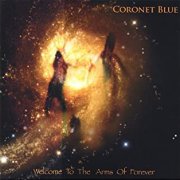 |
Welcome to the Arms of Forever (2007, 47.18) ***½/½ |
|
| Waiting for My Baby Looks Like Love Welcome to the Arms of Forever The Point Sorrow Street You Don't Sleep at Night Interlude #2 Promises |
No Kiss Goodnight Ain't it Strange Make No Mistake Listen Once |
|
Current availability:
Chamberlin used:
Orthopaedic surgeon (!) John Rooney and his songwriting partner, Tom Watson, played together in Sydney's The Lonely Hearts in the early '80s, forming Coronet Blue (named in honour of an obscure cult US '60s TV series) twenty years later, collaborating with powerpop legend Mitch Easter on their first two albums. The second of these, 2007's Welcome to the Arms of Forever, is a likeable roots-rock release, probably at its best on No Kiss Goodnight and closer Listen Once, participants including drummer Simon Kirke (Free/Bad Company) and pianist/organist Ian McLagan (Small Faces/Faces).
Mitch Easter plays (his?) Chamberlin M1, kept at Fidelitorium Studios, with occasional strings and muted brass on Waiting For My Baby, quite distinct from the real strings on most of the rest of the album.
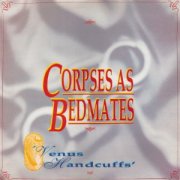 |
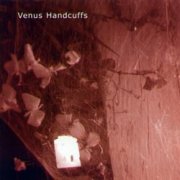 |
Venus Handcuffs (1987, 35.24) ***/T |
|
| Venus Handcuffs Haebsibah A Thought Through Shadows Fur Man Birds Fly Out Dear Dear Gus Black Box Phantom |
For the Rest of the Day Rest Home |
||
Current availability:
Mellotron used:
Corpses as Bedmates sound like an early project from future Ventricle label stalwarts Mauve Sideshow, although I don't believe there's any connection. Basically, this is darkwave before the term was coined; dense, often dissonant soundscapes of tortured synths, twisted samples and atonal female vocals from Susanne Lewis, aided and abetted by Bob Drake. Suffice to say, this probably falls into the overused 'love 'em or hate 'em' category; half measures don't appear to be an option. Venus Handcuffs does have some sonic variety; amongst the clanking lunacy are to be found gems of dark, orchestral beauty such as A Thought Through Shadows and Birds Fly Out, though the bulk of the album sounds more like an accident in a foundry involving several women and a harmonium.
Definite Mellotron (from Lewis) on Birds Fly Out, with harsh, almost distorted flutes and, while Phantom is swamped in keyboard-sourced choirs, they just don't sound enough like a Mellotron to count here. Samples? Who knows. Anyway, an early example of the sound that Ventricle would go on to make their own. One for the goth in your life, assuming they have the imagination to listen to anything more challenging than Marilyn Manson. Incidentally, the CD reissue has no mention of the band's original name, crediting it to simply Venus Handcuffs.
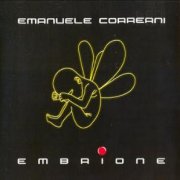 |
Embrione (2008, recorded 2002, 52.39) ***½/TTT |
|
| Occidente Oriente La Visione Cristina Sbadiglia Oberkampf Ambra Dome Sogno Delirio |
Suite Blanc Noir Pt. 1 Suite Blanc Noir Pt. 2 Respiro |
|
Current availability:
Mellotron used:
Embrione is Emanuele Correani's debut, released in 2008, although apparently recorded six years earlier. Best described as song-based progressive, only one of its eleven tracks tops six minutes and then not by much, Franco Battiato's brief, early '70s prog period being a much-quoted influence. Highlights? Cristina Sbadiglia, Oberkampf and both parts of Suite Blanc Noir, the nearest the album gets to an 'epic', perhaps.
Most of Correani's credited Mellotron work sounds real, although it's difficult to tell in a few cases, with strings on all highlighted tracks bar the flutes on opener Occidente Oriente, plus a flute solo and chordal choirs on Dome. Where did he source a machine? Unknown, but he was apparently working with his father as a professional engineer at the time (aged twentyish), so was probably well-placed to know owners of vintage keyboards. Anyway, decent album, sounds like real Mellotron. What's not to like?
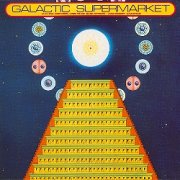 |
Galactic Supermarket (1974, 38.33) ****/TTKinder des AllsGalactic Supermarket |
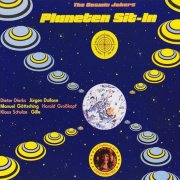 |
Planeten Sit-in (1974, 40.17) ***/T |
|
| Raumschiff Galaxy Startet The Planet of Communication Elektronenzirkus Der Narr im All Raumschiff Galaxy Fliegt in die Sonne Intergalactic Nightclub Loving Frequencies Electronic News |
Intergalactic Radio Guri Broadcasting Raumschiff Galaxy Gleitet im Sonnenwind Interstellar Rock: Kosmische Musik Raumschiff Galaxy Saust in die Lichtbahnen Der Planet des Sternenmädchens |
|
Current availability:
Mellotrons used:
Although The Cosmic Jokers are generally seen as the ultimate Krautrock supergroup, the albums released under that name were actually compiled from a series of drug-soaked sessions at Dieter Dierks' studio in 1973, including Klaus Schulze, Manuel Göttsching and Harald Großkopf from Ash Ra Tempel, Dierks himself and Jürgen Dollase from Wallenstein. The none-more-druggy end results were subsequently edited and mixed by Rolf-Ulrich Kaiser for his Cosmic Couriers label without the knowledge of the participants, eventually leading to a lawsuit from Schulze. Whatever its origins, Galactic Supermarket is a seriously trippy, jammed-out full-on Krautrock album, totally free from any commercial considerations; not the easiest music to listen to, especially, er, 'unassisted', but there's some pretty cool grooves in places, while the playing's top-notch, as you'd expect from such a stellar lineup. Dollase plays Mellotron choirs on side one, Kinder Des Alls, with several minutes of a four-chord repeating cycle that reminds me of early Pink Floyd, as does much of the Kraut stuff, a more random part dipping in and out of the mix over the rest of the track. Nice Mellotron work, although I wouldn't describe this as a Mellotron Album per se.
Planeten Sit-in is, essentially, the spaciest space rock you'll ever hear, the proverbial swooshing synths, er, swooshing about, sometimes over throbbing, psychedelic basslines, sometimes not. Drifting Mellotron strings on eight-minute closer Der Planet Des Sternenmädchens from Dollase again, but nothing you can't live without, frankly. It's difficult to tell how much of these albums' contents are distinct from each other, without thoroughly immersing myself in them. Clue: I really don't have the time. Or inclination. Despite the full-on dodginess of their genesis, they are actually a psychonaut's wet dream, standing up remarkably well over four decades later as one of the (possible and accidental) pinnacles of German '70s psychedelia, although Galactic Supermarket's the only one even slightly worth it for the Mellotron.
See: Sternenmädchen | Klaus Schulze | Ash Ra Tempel | Wallenstein
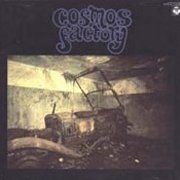 |
Cosmos Factory [a.k.a. An Old Castle of Transylvania] (1974, 40.41) ****½/TTTTSoundtrackMaybe Soft Focus Fantastic Mirror Poltergeist An Old Castle of Transylvania Forest of the Death The Cursed Darkness of the World An Old Castle of Transylvania |
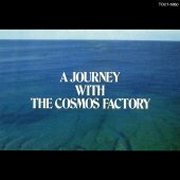 |
A Journey With the Cosmos Factory (1975, 42.56) ***½/½ |
|
| Sunday's Happening Daydream Hiver Confusion The Infinite Universe of Our Mind The Sea A Hidden Trap Wind in the Morning (a Trip) |
Journey of No Destination The Cosmogram |
|
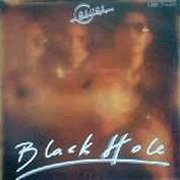 |
Black Hole (1976, 44.05) ****½/TTTBlack HoleThe Vague Image (intro) The Hard Image Crystal Solitaire A Wandering Young Man Days in the Past Mirror Freak Magic Window |
Current availability:
Mellotrons used:
Cosmos Factory (named for the Creedence Clearwater Revival LP) were a fantastic Japanese heavy psych/prog crossover outfit; dated for the mid-'70s, but Japan were several years behind at this stage, so they probably sounded pretty contemporary to their audience. They were enormously energetic, mad, frenetic organ and guitar solos peppering their work, along with rather incomprehensible Japanese-language vocals. The material on their eponymous debut (a.k.a. An Old Castle of Transylvania) is good, if not actually top-notch; plenty of excellent instrumental work and some great Mellotron from Tsutomu Izumi on the opening two tracks and the bulk of side 2's title track.
However, A Journey With the Cosmos Factory takes a complete left-turn from its predecessor, with experimental tracks like The Infinite Universe Of Our Mind, all discordant avant-garde piano, most of the material fitting more in the 'psych' than 'prog' categories. Excellent Moog work throughout, but next to no Mellotron (although loads of string synth), all I can hear being background choirs on beautiful opener Sunday's Happening. Black Hole (sensibly) returns to the style of their debut, though with a little more sophistication and a little less Mellotron. I don't hear any other sounds than the ubiquitous strings, but they make nice use of them, so I should worry.
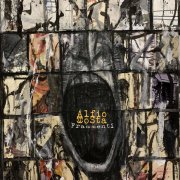 |
Frammenti (2020, 48.12) ****/TTT½...La NotteOmbre Nel Sole Luci in Note d'Ambra Frammenti Falena Scolopendra Canzone per un Respiro |
Current availability:
Mellotron used:
After decades of playing in a variety of acts (Daal, Tilion, Prowlers, Fufluns), keys wizard Alfio Costa released his first solo album, Frammenti (Fragments), in 2020. Given his history, it's hardly surprising that it can, effectively, be considered Costa's love letter to the '70s Italian progressive scene, influences clearly including the mighty Museo Rosenbach and Osanna, amongst others. As with so many albums from the 2020/21 period, this was a Covid lockdown project, its multiple guest musicians (every vocal piece features a different singer, including Osanna's Lino Vairetti) presumably working remotely, while Costa isn't afraid to let his guitarists crank it up when appropriate, thankfully more in a Museo or Balletto di Bronzo vein than that of contemporary prog metal. Highlights? Everything here's in the very-good-to-excellent category (possible weakest link: closer Canzone Per Un Respiro), but the twelve-minute Scolopendra has to be its crowning glory, near-indistinguishable from a lost work by one of the '70s greats.
Costa plays all keys (ancient and modern), getting the Mellotron onto several tracks, with subtly arranged string and flute parts on Ombre Nel Sole, the title track and Scolopendra and strings on Luci In Note D'Ambra, although I strongly suspect the pitchbent strings and choirs on Falena are something else. Mellotronic highlight? Scolopendra again, absolutely drenched in the thing, with a solo string part at its close. Given that this material wasn't even intended to be released as a solo album, Frammenti is a triumph, a beautiful piece of work that stands up against many classic RPI albums from the '70s. Recommended.
See: Daal | Tilion | Prowlers | Fufluns
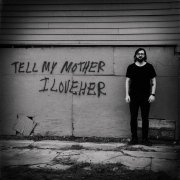 |
Tell My Mother I Love Her (2020, 38.14) ***/TT |
|
| I Don't Feel Like Having Fun Amber Eyes I Always Knew About You Sicka Tryna Love You Ashes Beaten Like an Egg Caught Feelings I Wanna Make You Mine |
When You Make Up Your Mind Kennel |
|
Current availability:
Mellotron used:
Saint Paul, Minnesota native Nick Costa worked his way through several bands before going solo in the late 2010s, 2020's Tell My Mother I Love Her being his second studio release. Described on his Facebook page as, "...if Harry Nilsson and Elliott Smith made a country record", the reality is slightly less 'classic songwriter', more 'middling talent with a few good ideas'. It might be at its best on Amber Eyes, Beaten Like An Egg and the rockier Caught Feelings, but, while a perfectly decent listen, little here really stands out.
Costa plays clearly real Mellotron, presumably Terrarium Studios' M400, with chordal flutes on Sicka Tryna Love You, strings and upfront flutes on Ashes and flutes and occasional strings on When You Make Up Your Mind. Nice to hear someone make the effort to use the Real Deal, even if the end result is less than stellar.
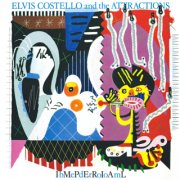 |
Imperial Bedroom (1982, 50.56) ***½/½ |
|
| Beyond Belief Tears Before Bedtime Shabby Doll The Long Honeymoon Man Out of Time Almost Blue ...And in Every Home The Loved Ones |
Human Hands Kid About it Little Savage Boy With a Problem Pidgin English You Little Fool Town Cryer |
|
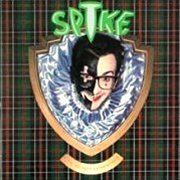 |
Spike (1989, 60.21) ****/TT |
|
| ...This Town... Let Him Dangle Deep Dark Truthful Mirror Veronica God's Comic Chewing Gum Tramp the Dirt Down Stalin Malone |
Satellite Pads, Paws and Claws Baby Plays Around Miss Macbeth Any King's Shilling Last Boat Leaving |
|
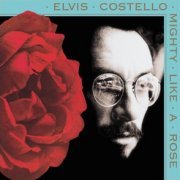 |
Mighty Like a Rose (1991, 54.29) ***½/T½ |
|
| The Other Side of Summer Hurry Down Doomsday (the Bugs Are Taking Over) How to Be Dumb All Grown Up Invasion Hit Parade Harpies Bizarre After the Fall Georgie and Her Rival |
So Like Candy Interlude: Couldn't Call it Unexpected No. 2 Playboy to a Man Sweet Pear Broken Couldn't Call it Unexpected No. 4 |
|
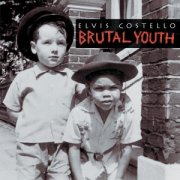 |
Brutal Youth (1994, 57.24) ***½/T |
|
| Pony St. Kinder Murder 13 Steps Lead Down This is Hell Clown Strike You Tripped at Every Step Still Too Soon to Know 20% Amnesia |
Sulky Girl London's Brilliant Parade My Science Fiction Twin Rocking Horse Road Just About Glad All the Rage Favourite Hour |
|
Current availability:
Chamberlins/Mellotron used:
Declan McManus renamed himself Elvis Costello in the late '70s and helped to invent what became known as 'New Wave', a term he's always despised, sardonically commenting that he couldn't understand why people compared his work to early-'60s French cinema. A master songwriter, the only thing that seems to stop him being compared to the likes of the godlike Richard Thompson more often would appear to be fashion, Elvis winning over Thompson every time. His seventh album, 1982's Imperial Bedroom, while good, struggles to maintain the quality of his second and third releases, at its probable best on opener Beyond Belief, Man Out Of Time, Human Hands, with its Coral Sitar refrain and Little Savage. According to yer man, in his 2015 autobiography, Unfaithful Music & Disappearing Ink, "We employed instruments that we wouldn't even have admitted to liking back in 1977, especially the Mellotron, which was then about as far out of style as flared trousers.". I'm not really sure they should've bothered, as the only place it's even remotely audible is what sounds like a short burst of super-phased, underwater choirs on Little Savage.
His twelfth album, Spike, is stuffed with his usual themes: wry commentary on modern life (...This Town..., the gorgeous Tramp The Dirt Down), Thompson-like takes on relationships (Pads, Paws And Claws, Baby Plays Around) and even history lessons (Let Him Dangle). All in all, a triumph of intelligent, erudite songwriting, the likes of which we hear all too seldom. Produced by Mitchell Froom, Spike falls right into the middle of his most prolific period as producer for hire, having also worked with Richard Thompson, Crowded House etc. Most of his standard production quirks are here, with not a synth to be heard, even of the analogue variety, the album standing or falling on the standard of the actual playing (remember that?), with contributions from Paul McCartney, Roger McGuinn, Benmont Tench, Allen Toussaint and a cast of thousands. Froom's Chamberlin is all over the highlighted tracks above, with strings and woodwind (clarinet?) on Veronica, flutes and muted brass on God's Comic, a minor string part on Satellite and, finally, what sounds like high-end cellos on Miss Macbeth.
While '91's Mighty Like a Rose is perfectly good, I somehow feel it doesn't quite reach the heights of its predecessor, although After The Fall is easily the equal of anything on that album, while Broken is superbly melancholy. Costello's lyrical barbs are as sharp as ever, Harpies Bizarre (ho ho) getting the knives out in no uncertain terms. Froom produces again, although his Chamberlin work is far more muted this time round, in fact, inaudible on some of the credited tracks. Just to confuse the issue further, that's clearly a Chamby string line in How To Be Dumb, with no mention in the booklet. About the best part on the album is actually Mellotron, with an excellent flute arrangement on So Like Candy, drowning out the Chamby cellos (?), which do their usual trick of disappearing in the mix. Other than that, just when you think you've spotted the thing, it turns out to be one of the string/brass/woodwind instruments scattered across the album.
'94's Brutal Youth regains some of the ground lost on Mighty Like a Rose for its first half, but unfortunately ends up slightly outstaying its welcome, partially falling prey to the infamous 'fill that CD' syndrome. Highlights include Kinder Murder and Clown Strike, but more average fair such as Just About Glad or All The Rage rather let the side down. The album is notable for being a partial reunion of the Attractions, despite Costello's long-running feud with bassist Bruce Thomas, whose vicious lampooning of his erstwhile boss as 'the singer' in his semi-autobiographical novel The Big Wheel only served to exacerbate the situation. It is, however, extremely funny... Froom co-produces with Costello again; the only keyboard credits are for Costello (piano) and Steve Naïve/Nieve/Nason (piano/organ/harmonium), so who exactly plays everything else? Almost certainly Froom, of course, with organ here and there and three fairly overt Chamberlin tracks towards the beginning if the album; This Is Hell features muted brass, with more of the same, but less so, on Clown Strike, while You Tripped At Every Step has a nice little flute run. So, not really a Chamby album (again), but a good record in its own right, nevertheless.
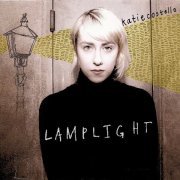 |
Lamplight (2011, 47.22) **½/T½ |
|
| Cassette Tape Ashes Ashes After Dark No Shelter Despite Time Out of Our Minds Fading Lately Dig a Hole |
Old Owl People: A Theory The Weirds Stranger |
|
Current availability:
Chamberlin used:
Ex-Californian New Yorker Katie Costello makes the kind of singer-songwritery stuff that's used on second-rate US TV shows. As a result, her second album, 2011's Lamplight, is infuriatingly inconsistent, as her better instincts (opener Cassette Tape, with its "I hate talking!" refrain, the peculiar, clattery Despite Time and the quirky People: A Theory) clash with commercial 'reality' (Out Of Our Minds, Fading Lately, Old Owl). An album of two halves, then.
Patrick Warren does his usual Chamberlin thing, with occasional male voices on opener Cassette Tape, strings all over After Dark, chordal flutes on Despite Time, an unidentified something Chamberlinic on Dig A Hole and flutes on People: A Theory. At least, I think they're all Chamby; it's not always easy to say. Anyway, despite its better tracks, I can't honestly recommend this, Chamby or no Chamby.
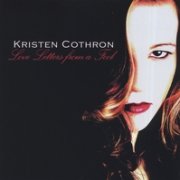 |
Love Letters From a Fool (2006, 39.34) **½/T |
|
| Dangerous High on the Blues Last Chance Girl Love Letters From a Fool Your Love RSVP Slow Down Whenever You Come Around |
Love is a Gamble Fall |
|
Current availability:
Mellotron/Chamberlin used:
An online review of Kristen Cothron describes her as 'combin[ing] cabaret and indie rock', which probably isn't too far off the mark, at least on 2006's Love Letters From a Fool. I'm afraid I'm struggling to identify any standout tracks; I'm sure her jazz-inflected indie thing is perfectly good at what it does, but it left me completely cold. Sorry.
Producer Ben Strano's credited with Mellotron and Chamberlin, presumably the Chamby (flute) and Mellotron (string) parts on Your Love, sounding surprisingly real, I have to say. Sadly, they do little to enliven this rather dull record.
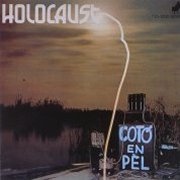 |
Holocaust (1978, 37.32) ****/TTTAura de SonsLamentacions Holocaust (Part 1) Holocaust (Part 2) |
Current availability:
Mellotron used:
Coto-en-Pel were another of those one-shot late '70s Spanish progressive bands that, sadly, appeared and disappeared before anyone really noticed. Their sole legacy, Holocaust, is a fine album, maybe a little less obviously 'Spanish' than many of their contemporaries, its guitar work recalling Steve Howe in places. The album is mostly instrumental, just the occasional vocal part cropping up; keyboards are the usual suspects, with quite a lot of string synth, at least on Aura De Sons.
Pep Llopis' Mellotron finally turns up on the two-part title track; just strings on Part 1, but their (borrowed?) machine's full complement of strings, flute and choir on Part 2. While not as full-on as some, there's a fair bit of Mellotron to be heard here and the album's bloody good into the bargain. Top marks, once again, to The Laser's Edge for digging up a worthy rarity. Buy.